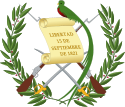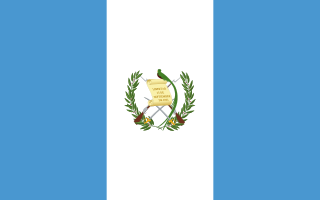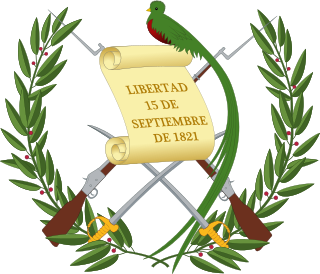
Politics of Guatemala takes place in a framework of a presidential representative democratic republic, where by the President of Guatemala is both head of state, head of government, and of a multi-party system. Executive power is exercised by the government. Legislative power is vested in both the government and the Congress of the Republic. The judiciary is independent of the executive and the legislature.

The first fully democratic Presidential election since 1960 occurred on 11 March 2007. The election was the final transfer from military to civilian rule following the military coup in 2005. This was the first time the president was selected by ballot in the country's history. The election was won by Sidi Ould Cheikh Abdallahi, who was ousted by a military coup in 2008 and replaced by general Mohamed Ould Abdel Aziz.

The Party for Democracy is a centre-left political party in Chile. It states to stand in the traditions of democratic socialism and liberal progressivism. It was founded in December 1987 by Ricardo Lagos, who aimed at forming a legal social-democratic party, as the Socialist Party of Chile (PS) remained illegal at the time. The PPD continued to function after the defeat of Pinochet. Until 1997, double membership of PPD and the PS was allowed.

The Socialist Party of Chile is a political party within the centre-left Nueva Mayoría. Its historic leader was President of Chile Salvador Allende, who was deposed in a coup d'état by General Pinochet in 1973. Twenty-seven years later, Ricardo Lagos Escobar represented the Socialist Party in the 1999 presidential elections. He won 48.0% in the first round of voting and was elected with 51.3% in the second round. In the legislative elections on 16 December 2001, as part of the Coalition of Parties for Democracy, the party won 10 out of 117 seats in the Chamber of Deputies and 5 out of 38 elected seats in the Senate. After the 2005 elections, the Party increased its seats to 15 and 8, respectively. In the 2009 elections, it retained 11 Congressional and 5 Senate seats.

The Nationalist Republican Alliance is a conservative, right-wing political party of El Salvador. It was founded on 30 September 1981, by retired Salvadoran soldier Roberto D'Aubuisson and Mercedes Gloria Salguero Gross. It defines itself as a political institution constituted by "Salvadorans who defend the democratic, republican, and representative system of government, the social market economy system and nationalism".

The Green Party of Minnesota is a green political party in the U.S. state of Minnesota. It is affiliated with the Green Party of the United States.
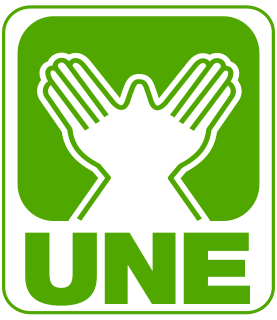
The National Unity of Hope is a political party in Guatemala. It was founded in 2002 and defines itself as a social-democratic and social-Christian party.

Juan Federico Ponce Vaides was the acting President of Guatemala from 4 July 1944 to 20 October 1944. He was overthrown by a popular uprising in October 1944 that began the Guatemalan Revolution.
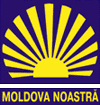
The Our Moldova Alliance was a social-liberal political party in Moldova led by Serafim Urechean, former mayor of Chișinău. It merged into the Liberal Democratic Party of Moldova (PLDM) during April 2011.
The Liberals of Serbia was a political party in Serbia.

Álvaro Colom Caballeros is a Guatemalan politician who was the President of Guatemala from 2008 to 2012, as well as leader of the social-democratic National Unity of Hope (UNE).
The Patriotic Party was a conservative political party in Guatemala. It was founded on 24 February 2001 by retired Army General Otto Pérez Molina.

Podemos previously: Movimiento Reformador is a liberal party in Guatemala. It is led by Jorge Briz Abularach.
Guatemalan Christian Democracy was a political party in Guatemala. A moderate, reformist and anti-Communist party, it was a member of Christian Democrat International.

A general election was held in Guatemala in two rounds on 9 September and 4 November 2007. Voters went to the polls to elect a new President and Vice President of the Republic, 158 congressional deputies, and 332 mayors.
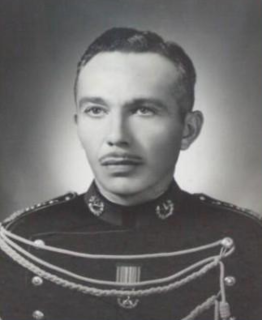
General elections were held in Guatemala on 3 March 1974. No candidate received more than 50% of the vote in the presidential election, resulting in Kjell Eugenio Laugerud García being elected president by Congress on 12 March. The Congressional elections were won by an alliance of the Institutional Democratic Party and the National Liberation Movement. Voter turnout was 46.41% in the presidential election.
Antipas Mbusa Nyamwisi is a politician and former rebel leader in the Democratic Republic of the Congo. He leads the Forces for Renewal political party and was Minister of Decentralization and Urban and Regional Planning until September 2011 when he resigned to run for president. He was previously the Minister of Foreign Affairs from 2007 to 2008.
The Institutional Democratic Party was a Guatemalan pro-government political party active during the 1970s.
Jorge Carpio Nicolle was a prominent Guatemalan politician and newspaper publisher. He was the founder of the Unión del Centro Nacional in 1984, and ran as the party's candidate for president in the elections of 1985 and 1990. He came in second in both elections. He was the founder, director and editor of El Gráfico, at one time one of Guatemala's largest newspapers. He also founded La Tarde, El Deportivo, La Razón, and other newspapers during his career. He also served as Guatemala's Ambassador to the United Nations, and formed part of the commission on human rights (1966) He was assassinated on July 3, 1993, along with Juan Vicente Villacorta Fajardo who was a member of one of Guatemala's oldest and well known political families and two other political leaders of the UCN, in the municipality of Chichicastenango, El Quiché. Surviving witnesses reported that the murders took place after the group was intercepted by members of the Army Self Defense Patrols, a type of paramilitary unit under the control of the Guatemalan Army. According to his widow, Marta Arrivillaga de Carpio, who was with Carpio and the others during the attack, the party's minivan was stopped by a group of armed men in ski masks. The assailants said "You're Jorge Carpio" and then shot him three times. The other victims of the attack were Alejandro Ávila Guzmán, and Rigoberto Rivas González.
